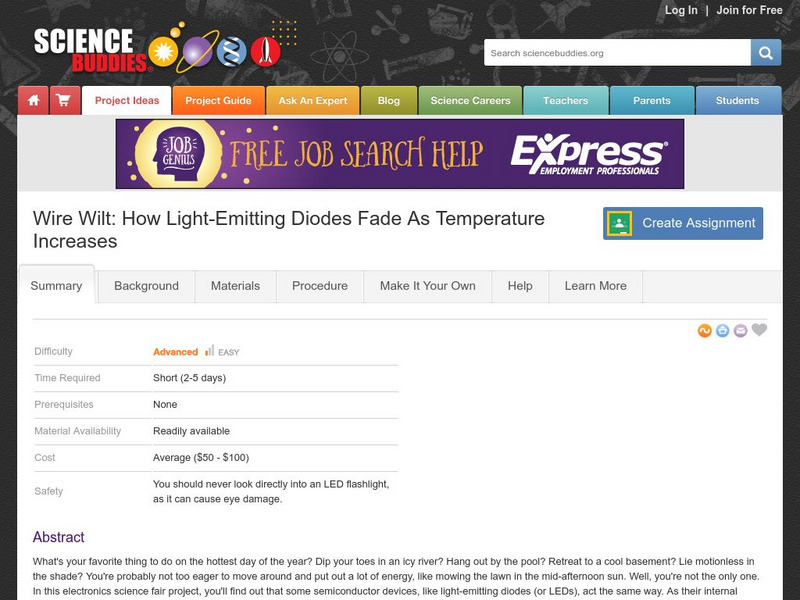Curated OER
Learning Lesson: Crunch Time
Students demonstrate the effect of heat on pressure. They use a 2-liter bottle and hot tap water to complete the experiments. They also discuss thunderstorm safety rules.
Curated OER
The Heat is On
Third graders experiment with heat through investigations. They rub objects together and compare the relative differences in the amount of heat given off. They write in their journals about the results they find.
Curated OER
How Hot Is It?
Sixth graders use paper cups, black and white lining, thermometers and plastic wrap to conduct an experiment that measures the energy-collecting capacity of various colors. They graph the results.
Curated OER
Too Hot to Handle
Learners identify sources of geothermal energy. They watch videos and investigate the sources of geothermal energy.
Curated OER
Go With the Flow!
Learners experiment with heat transfer in a countercurrent system and describe the importance of conduction in heat-energy transfer.
Curated OER
Heat Currents
Students using a slide made out of aluminum foil and pin holes observe visible light.
Curated OER
How Cool Is Your Environment?
Students study the formulas for calculating heat energy and how to convert Celsius to Fahrenheit. They apply the formulas on a worksheet.
Curated OER
Metamorphic Sandwiches - - "Bread Rock"
Students graphically show how metamorphic rock is formed by pressure and heat using bread.
Curated OER
Changing State
Students participate in an online lesson to investigate the effects of cooling and heating on water.
Curated OER
Cooler in the Shadows
Students explore how the amount of sunlight and heat change in areas that are shaded.
Curated OER
Heating
Students develop the idea that heat is a form of energy which moves from hot objects to cold ones.
Curated OER
WATTS UP?
Second graders research the Internet as they classify different forms of energy, investigate electrical energy and how to conserve energy.
Curated OER
Investigation 7 - Rubbing Objects Together
Third graders investigate rubbing two objects together to produce heat.
Curated OER
Let There Be Light
Students observe that different lights have different effects on matter. Students see that ultraviolet light is powerful although it cannot be seen through this teacher led demo-experiment.
Georgia State University
Georgia State University: Hyper Physics: Heat and Thermodynamics
Georgia State University Physics Department privides an incredibly thorough treatment of the laws of thermodynamics. Multiple pages; many informative graphics; opportunities to practice problems and receive immediate feedback.
University of Toronto (Canada)
University of Toronto: Entropy
A discussion of entropy that focuses on explaining entropy, how it applies to the second law of thermodynamics, and real-life observations of the existence of entropy.
PBS
Pbs Kids: Design Squad Challenge: Feel the Heat (Pdf) [Pdf]
Hands-on challenge to heat things up by building a solar hot water heater. Provides full list of materials with ideas on how to design, build, test, and redesign it if necessary. Activity focuses on the engineering design process and the...
Science Buddies
Science Buddies: Wire Wilt: Light Emitting Diodes Fade as Temperature Increases
In this electronics science fair project, students will investigate how the output of an LED flashlight changes as its temperature increases.
Science Buddies
Science Buddies: Radiant Radish Seeds
We all know that plants need sunlight and water to grow big and tall. But did you know that inside seeds are baby plants, and that the fragile baby plant inside the seed needs to be protected? If you've ever had a sunburn, you also know...
Science Buddies
Science Buddies: Pop Goes the Geyser!
Our home, Earth, is a living planet. Earthquakes and volcanic eruptions are proof that the geological forces that shaped our planet and created the land masses are ongoing. An amazing example of geologic activity that is less damaging is...
BioEd Online
Bio Ed Online: Moving Air
In the following lesson plan for students grades 3-5 students observe how changing the temperature affects a small amount of air inside of a bubble. Student sheets are provided in English and in Spanish.
American Chemical Society
Middle School Chemistry: Chapter 2: Changes of State
Five chemistry lessons about phase changes between the states of mattter complete with handouts and animations.


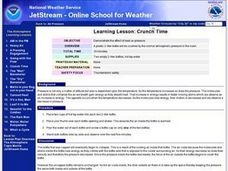











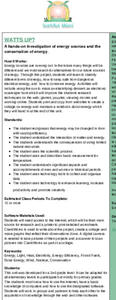

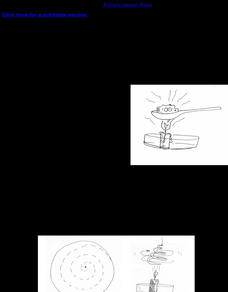


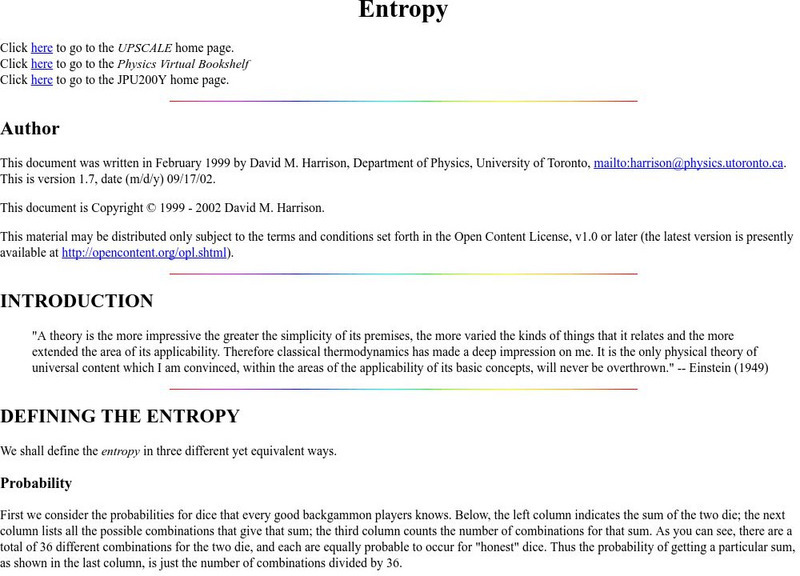
![Pbs Kids: Design Squad Challenge: Feel the Heat (Pdf) [Pdf] Handout Pbs Kids: Design Squad Challenge: Feel the Heat (Pdf) [Pdf] Handout](https://content.lessonplanet.com/knovation/original/39873-ae8d75ec09f51ea05c443973c536d5aa.jpg?1661243849)
